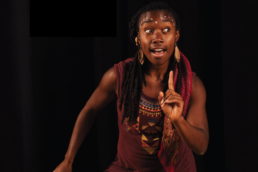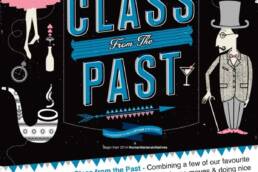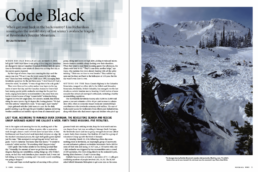Shayna Jones’s multimedia project explores narratives of race in the face of rural living. By Louis Bockner
In the West Kootenay village of Kaslo, British Columbia, 31-year-old Shayna Jones stands out. It’s not that she is the only professional storyteller there or that she often wears colourful dresses and layers of dangling jewellery. What others notice is that Jones is Black in a mountain town that is almost entirely white. This existence, along with its many challenges, is the inspiration behind her latest body of work, a touring show called The Black & Rural Project.
For over a year, Jones — who grew up in Vancouver and is a trained actor and vocalist, and an award-winning storyteller — has been interviewing people across Canada who share a similar story to hers: they are Black, live rurally, and are often the extreme minority. “We will never leave our Blackness behind,” says Jones. “It’s always there; it’s always up for discussion, and this sense of not being able to escape your Blackness is both empowering and challenging.”
The end goal of the project is to create a touring show that blends the interviews into a theatrical performance comprised of song, storytelling, percussion, and acting — a medley of creativity that Jones is well versed in after years of captivating audiences with tales inspired by the traditional oral storytelling of African and Afro-diasporic folklore. A multimedia component will accompany the performance and be comprised of portraits of the participants that allow viewers to dive deeper into each individual’s narrative. Initially funded by the BC Arts Council, Jones is pursuing additional support from the Canada Council for the Arts and the Columbia Kootenay Cultural Alliance to continue developing the project, which will debut in 2022.
By diving into the experience of Black people living in a rural setting, Jones has found meaning and value in her own story. “No matter the race or creed, the cards we are dealt are the pieces we’re supposed to grapple with, rage against, come to peace with, and look in the eye,” she says. “It’s not a mistake that I’m a Black woman living in this little white town. There’s something for me to learn from this.”
Related Stories
Cold Rush – Behind the Scenes
Sure, there was a boatload of photographers and cinematographers at the Red Bull Cold Rush. And then there was me, with…
The story behind the photo edit
Many of you may have already read the piece in the winter issue on Rob Newsom. He's an interesting and gregarious…
Sweetgrass Productions Introduces New Project – Valhalla
If you haven't been able to crawl out from dark ether to watch Solitaire, by the Colorado-based production company…
Code Black – KMC Dives Deep into a Backcountry Tragedy
Find out about the largely unreported truth behind the tragedy last year on Revelstoke's Boulder Mountain. While two…






